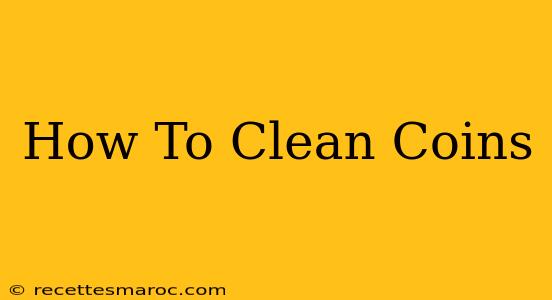Cleaning coins might seem straightforward, but improper methods can severely damage their value and historical significance. This comprehensive guide will walk you through the best practices for cleaning coins, ensuring you preserve their beauty and worth. Whether you're a seasoned numismatist or just starting your coin collection, understanding proper cleaning techniques is crucial.
Why You Shouldn't Clean Coins (Most of the Time)
Before diving into cleaning methods, it's essential to understand that most coins don't need cleaning. The natural patina—that layer of tarnish and discoloration—actually protects the coin from further deterioration. Cleaning often removes this protective layer, potentially causing irreversible damage. The value of a coin is often directly tied to its condition, and aggressive cleaning can significantly reduce its worth. Think of it like this: a coin's patina is like a protective skin; once removed, the underlying metal is vulnerable.
When Cleaning Is Necessary:
There are exceptions. Cleaning might be considered in these limited cases:
- Extremely dirty coins: If a coin is heavily encrusted with dirt or grime that obscures details, careful cleaning might be warranted. However, proceed with extreme caution.
- Coins with active corrosion: If you see signs of active rust or other forms of corrosion, professional cleaning might be necessary to prevent further damage.
- Preparation for grading: If you're planning to submit your coin for professional grading, they may have specific cleaning requirements. Check with the grading service beforehand.
Always remember: If you're unsure whether to clean a coin, it's best to err on the side of caution and leave it alone.
Safe Coin Cleaning Methods (When Absolutely Necessary)
If you've determined that cleaning is truly necessary, proceed with these gentle methods. Never use harsh chemicals or abrasive materials.
1. The Gentle Soak:
- For lightly soiled coins: A simple soak in distilled water might be sufficient. Avoid tap water, as it can contain minerals that can damage the coin. Let the coin soak for a short period, then gently rinse with distilled water and pat dry with a soft, lint-free cloth.
2. The Soft Brush Approach:
- For coins with loose dirt: Use a very soft brush, such as a soft-bristled artist's brush or a toothbrush with extremely soft bristles. Gently brush away loose dirt under running distilled water. Avoid applying too much pressure.
3. Ultrasonic Cleaning (Use With Extreme Caution):
- For experienced collectors only: Ultrasonic cleaners use high-frequency sound waves to dislodge dirt and grime. This method can be extremely damaging if not used properly. It's crucial to use a specialized coin-cleaning solution and a short cleaning cycle. Improper use can strip away the coin's protective patina and cause pitting.
What NOT to Use When Cleaning Coins
Absolutely avoid these materials and substances:
- Harsh chemicals: Bleach, acids, and other strong chemicals will irrevocably damage your coins.
- Abrasive cleaners: Steel wool, scouring pads, and even some toothpastes can scratch the surface of your coins.
- Toothbrushes (most): While a very soft-bristled toothbrush might be okay in some circumstances, most are too harsh.
- Ultrasonic cleaners (without expertise): Improper use can be devastating.
Protecting Your Cleaned Coins
Once you've cleaned your coin (if necessary), it's vital to protect it from further damage. Store your coins in protective sleeves or holders designed for numismatic purposes, and handle them with clean, gloved hands.
When to Seek Professional Help
For valuable or rare coins, always consult a professional numismatist. They have the expertise and equipment to safely clean and preserve valuable pieces. Attempting to clean a valuable coin yourself could severely diminish its worth.
By following these guidelines, you can ensure that your coins remain in excellent condition for years to come. Remember, preservation is key—cleaning should always be a last resort.

